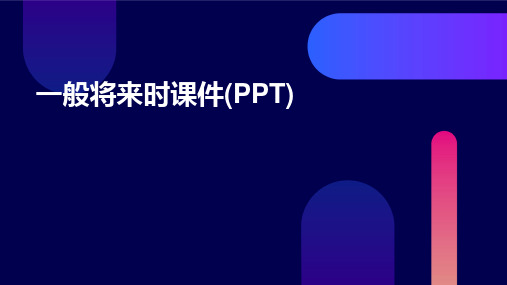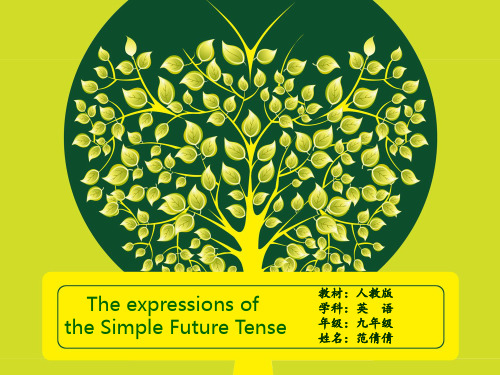一般将来时课件(PPT)75674
2024年度一般将来时态ppt课件

使用一般将来时态表达对他人的承 诺和保证,如“我保证会按时完成 工作”或“我将会帮你解决这个问 题”。
20
商务工作场景举例
01
商务会议安排
在商务会议中,使用一般将来时态安排未来的会议日程和计划,如“我
们下周一将要召开项目会议”或“我将会提前发送会议材料给你”。
2024/2/2
02 03
21
学术写作场景举例
2024/2/2
论文写作
在学术论文中,使用一般将来时态描述研究方法和未来研究方向,如“本文将会采用问卷 调查的方法来收集数据”或“未来的研究可以进一步探讨该领域的更深层次问题”。
报告撰写
在撰写各类报告时,使用一般将来时态预测未来趋势和提出建议措施,如“根据当前数据 分析,未来市场需求将会持续增长”或“政府应该采取措施来加强环保工作”。
肯定句:主语+be going to+动词原形+其他成分 。
2024/2/2
否定句:主语+be not going to+动词原形+其 他成分。
注意be动词要根据主语的 人称和数进行变化。
疑问句:Be+主语 +going to+动词原形+ 其他成分。
9
其他表达方式
be about to do sth
6
02
CATALOGUE
一般将来时态常用表达方式
2024/2/2
7
will/shall+动词原形
表示将来某个时间要 发生的动作或存在的 状态,常跟表示将来 的时间状语连用,如 tomorrow, next week, in the future 等。
在第一人称和第三人 称单数中,常用will表 示将来,而在第二人 称和第三人称复数中 ,常用shall表示将来 ,但在现代英语中 shall的使用已不太普 遍。
(完整版)一般将来时课件(PPT)

①
②
③
① Who will have an English party next week ?
② What will they have next week ?
③ When will they have an English party?
2. be going to 表将来
will 和be going to 的区别
回答:(肯)Yes,主语+will. (否)No,主语+won’t.
Yes,they will./No,they won’t.
They won’t(will not) have an English party next week.
注意:won’t=will not
(3).变特殊疑问句
They will have an English party next week.
他现在在北京。 He __i_s_ in Beijing now.(be)
他昨天在上海。
He w__a_s in Shanghai yesterday. (be) Hew_i_ll_be in Shanghai tomorrow. (be)
二、一般将来时的时间状语
1.与“tomorrow一家” 连用:
buy the oranges tomorrow?
2.Who _w_i_ll_i_n_ve_n_t (invent) a new
computer in 2050? 3.We _w_il_l _g_o (go) to the cinema next
Sunday. The film _w_il_l _b_e (be) very
6. He usually _g_e_t_s (get) up at 6 in the morning. Look! He i_s_g_e_t_t_in(gget) up now. But yesterday he _g_o_t_ (get) up very late, so he _w_e_n_t (go) to
一般将来时课件(PPT)

“be able to”表示将来有能力做某 事时,使用一般将来时形式,例如“I will be able to help you”。
情态动词如“can”、“may”、 “must”等,在一般将来时中通常直 接加动词原形,例如“I can swim”。
03
一般将来时在句子中的运用
陈述句中的使用
表示将要发生的动作或存在的状态
纠正方法
应使用正确的将来时形式,如 "He will go to the park tomorrow." 或 "He is going to the park tomorrow."
忽略动词变化规则
错误示例
They will play football in the future.(忽略了动词play在将来时中的变化)
纠正方法
在将来时中,应使用正确的助动词或情态动词形式,如 "I will be able to help you with your homework." 或 "I can help you with your homework."
错误示例
He will must finish his work before leaving.(错误地使 用了情态动词must)
作用
用于表示未来的计划、打算、预测、 假设等。
常见表达形式
will + 动词原形
表示将来的动作或状态,如“I will go to the park tomorrow.”(我明天将去公园。)
be going to + 动词原形
表示计划、打算或即将发生的动作,如“I am going to study hard this semester.”(我这 学期打算努力学习。)
一般将来时PPT课件(PPT18张)

e.g.
① Th翻er译e :is g下oi周ng这to里b将e 会a s有po一rt个s m运e动et会ing。next week.( (肯定式)
② There isn’t going to be a sports meeting next week (否定式) ③ ——Is there going to be a sports meeting next week?(一般疑问式)
be going to be + done (表示按计划或安排发生的被动动作)
be about to
(指将要发生的事情)
be.tgo. be + done (表示按计划或安排发生的被动动作)
1. The bridge will be finished
next month. (finish)
2. The problem is going to be discussed at the meeting.(be going to,discuss) 3. The sports meet is to be held on Oct. 运动会将于10月5日举行
4. do sth表将来 一般现在时表将来,主要用于时间状语从句和条件状语从句中,或者用来表示 按照时刻表的规定将要发生的事情。如: I’ll tell him about it as soon as I see him.我一见到他就告诉他这事儿。 My plane takes off at seven tomorrow morning. 我的飞机明天早上7点起飞。
A. are having B. are going to have C. will having D. is going to have
一般将来时PPT课件

•一般将来时基本概念•一般将来时结构与用法•一般将来时时间状语及标志词•一般将来时与其他时态对比•一般将来时在各类从句中运用•一般将来时误区及注意事项•总结回顾与拓展延伸目录01一般将来时基本概念定义与特点定义特点表现形式will + 动词原形be going to + 动词原形现在进行时表示将来预测未来计划与安排条件与假设030201使用场景02一般将来时结构与用法主语+ be not going to + 动词原形+ 其他成分主语+ be to not (非标准用法,尽量避免使用) + 动词原形+ 其他成分主语+ will not (won't) + 动词原形+ 其他成分Will + 主语+ 动词原形+ 其他成分?Be + 主语+ going to + 动词原形+ 其他成分?Be + 主语+ to + 动词原形+其他成分?(较少使用,多用于书面语)特殊疑问词动词原形特殊疑问词going to +成分?特殊疑问词to +(较少使用,多用于书面语)注意:在一般将来时的使用中,要注意区分不同语境和表达方式的细微差别,选择合适的结构进行表达。
同时,也要注意与其他时态的区分和联系,避免混淆使用。
特殊疑问句结构03一般将来时时间状语及标志词常见时间状语表示将来的时间状语表示计划或安排的时间状语标志词识别与运用04一般将来时与其他时态对比与现在进行时对比时间指向不同01动词形式差异02使用情境不同03时间基准差异动词形式变化使用情境区别时间范围不同动词形式区别使用情境差异05一般将来时在各类从句中运用在宾语从句中运用01 02定语从句的时态取决于它所修饰的先行词,如果先行词是将来时态,定语从句也使用将来时态。
如果先行词是过去将来时,定语从句则使用过去将来时。
定语从句中表示将来的时间状语有:tomorrow, next year, in the future 等。
06一般将来时误区及注意事项误区二过度使用“will”和“going to”。
一般将来时态讲解(共25张PPT)

• I don't think the test will be very difficult. 。
②用于“祈使句 + and + 陈述句” 中
I don’t think it will rain this afternoon.
I am hungry. I think I’ll have something to eat.
表示看法,观点
“There be”句型的一般将来时 肯定句: There will be +名词+其他成份 [注意]:无论后面加单数名词或复数形式,be都必须用原形。
shall适用于第一人称I,We;而will适用于所有人称。 通常可以用will来代替shall。 will,shall均可缩写为:'ll,如:
I will= I'll; she will = she’ll;will not 和shall not分别可以 缩写为 won't 和shan't。
1.一般将来时的用法
4. be about to + 动词原形。 表示 (1)“即将做”或“马上做”
(2)因此,句子不能再用时间状语。
Don’t leave. Li Lei is about to come. 不要走了,李蕾就要来了。 Be quiet. The concert is about to start. 安静下来,音乐演唱会就要开始了。
• My uncle will come to see me every Saturday.
• 我叔叔每个星期六都会来看我。
• The students will have five English classes per week this term.
一般将来时课件ppt(共17张PPT)

Jim going to
afternoon?
in the playground tomorrow
4. .Jim is going to play football in the playground tomorrow afternoon.
Jim going to play football tomorrow afternoon?
2)在浊辅音和元音后读/d/.
一般过去时, 要用动词过去式. Jim is going to play football in the playground tomorrow afternoon.
Jim is going to play football in the playground tomorrow afternoon. ⑵are变为were。
there were many beautiful flowers there. 一般将来时表示将来某个时间要发生的动作或存在的状态常与表示将来的时间状语连用
⑴am ,is变为was。
So she They to read some books.
What did they do in the park? 1)在清辅音后读/t/ .
(3).动词过去式变化规则
a)一般情况下,直接加ed.如:wash--washed, look---looked; b)以不发音字母e结尾的,加d.如:like---
liked, dance---danced; c)以“辅音字母+y”结尾的,变y为i再加ed. 如:study---studied;
food and (play) lots of games. They
(come) home at 4:30.
一般将来时PPT课件

一、单项选择
(C) 1. There __________ a meeting tomorrow afternoon.
A. will be going to B. will going to be C. is going to
shall常用于第一人称. shall
否定式:shall not = shan’t
will常用于第二、三人称,但在 will 口语中各种人称都可以用will.
否定式:will not = won’t
四、现_在___进__行___时态 + 表示将来的时 间状语也可以表示将来。
五、There be 句型的一般将来时态 的结构:there +is_g_o_in_g_to_ + be + 名词或there + will+ be + 名词。
begoingto表示根据主观判断将来肯定发生的事情表示根据主观判断将来肯定发生的事情will表示客观上将来势必发生的事情
The Simple Future Tense
一、一般将来时表示将来某一 时刻的动作,状态以及打算。 该时态一般与表示将来意义 的时间状语连用。如:
tomorrow, this month, the day
next week.
A. will be; is
B. is; is C. will be; will be D.
is; will be
(D) 4. There ________ a dolphin show in the zoo
tomorrow evening.
A. was B. is going to have C. will have D. is going
- 1、下载文档前请自行甄别文档内容的完整性,平台不提供额外的编辑、内容补充、找答案等附加服务。
- 2、"仅部分预览"的文档,不可在线预览部分如存在完整性等问题,可反馈申请退款(可完整预览的文档不适用该条件!)。
- 3、如文档侵犯您的权益,请联系客服反馈,我们会尽快为您处理(人工客服工作时间:9:00-18:30)。
Please look at the sentences
我今年12岁.
I _a_m_ 12 years old this year.(be) 我去年11岁. I _w__a_s 11 years old last year(be)
I w__i_l_l be13 years old next year(be)
2. be going to+do可表示事先计划的意图,而 will 则表示说话人当时决定的意图;
We're going to drive you home after the meeting. Don't call a taxi. We'll drive you home.
I feel ill now, and I'll go to see the doctor. I'm going to see the doctor this evening.
什么是一般过去时?
future
past now 一般过去时态表示过去某一时间发生 的动作或存在的状态。
He watched TV last night.
一、什么是一般将来时?
future
past now 一般将来时态表示在将来某一时间将 发生的动作或存在的状态。
He will watch TV tomorrow evening.
He will go to Beingjing next week
(2).变一般疑问句和否定句:
They will have an English party next week. Will they have an English party next week?
回答:(肯)Yes,主语+will. (否)No,主语+won’t.
①
②
③
① Who will have an English party next week ?
② What will they have next week ?
③ When will they have an English party?
2. be going to 表将来
will 和be going to 的区别
一般将来时态
(The Simple Future tense)
所有时态 都是通过
动词 变化来体
现的
future past now He often watches TV at night.
一般现在时
复习所学时态
future past now He is watching TV now.
现在进行时
Yes,they will./No,they won’t.
They won’t(will not) have an English party next week.
注意:won’t=will not
(3).变特殊疑问句
They will have an English party next week.
He is studying hard and is going to try for the exams. 他正努力学习,准备参加考试。(不能 用will替换)
—Can somebody help me? ——谁能帮我一下吗? —I will. ——我来。(不能用be going to替换)
3.现在进行时表将来
will 表示客观的将来,必定会发生 be going to根据迹象推测,有可能发生
----Look at the clouds outside . ----It's going to rain .
You will be forty years old next year. Tomorrow will be Sunday again.
Who Is Wearing Yellow Today Yellow Today Yellow Today
Who Is Wearing Yellow Today Yellow Today Who Is Wearing Red Today Red Today Red Today Who Is Wearing Red Today Red Today Who Is Wearing Green Today Green Today Green Today Who Is Wearing Green Today Green Today Who Is Wearing Blue Today Blue Today Blue Today Who Is Wearing Blue Today Blue Today Who Is Wearing Black Today Black Today Black Today Who Is Wearing Black Today Black Today Who Is Wearing White Today White Today White Today Who Is Wearing White Today White Today Who Is Wearing Pink Today Pink Today Pink Today Who Is Wearing Pink Today Pink Today
(1).will和shall为助动词,will用 于任何人称,但shall只能用于第一 人称主语I和we。 I will/shall go to school tomorrow.
They will go to school tomorrow.
We will/shall go to Beingjing next week.
他现在在北京。 He ___i_sin Beijing now.(be)
他昨天在上海。
He _w_a_s in Shanghai yesterday. (be) He w_i_l_l bien Shanghai tomorrow. (be)
二、一般将来时的谓语构成:
1.助动词will/shall +do
表示位置转移的动词(如:go, come, leave, start, arrive等),可用现
在进行时表示将来时
I’ m going fiபைடு நூலகம்hing tomorrow. They‘ re leaving for Beijing next week.
